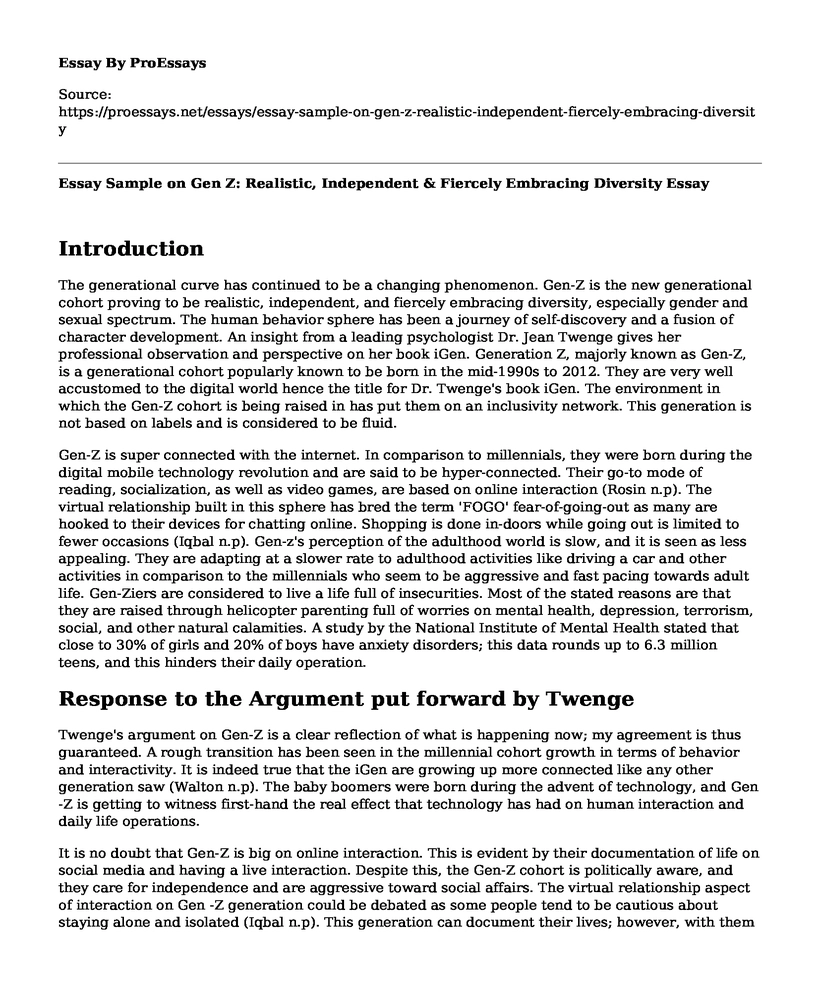Introduction
The generational curve has continued to be a changing phenomenon. Gen-Z is the new generational cohort proving to be realistic, independent, and fiercely embracing diversity, especially gender and sexual spectrum. The human behavior sphere has been a journey of self-discovery and a fusion of character development. An insight from a leading psychologist Dr. Jean Twenge gives her professional observation and perspective on her book iGen. Generation Z, majorly known as Gen-Z, is a generational cohort popularly known to be born in the mid-1990s to 2012. They are very well accustomed to the digital world hence the title for Dr. Twenge's book iGen. The environment in which the Gen-Z cohort is being raised in has put them on an inclusivity network. This generation is not based on labels and is considered to be fluid.
Gen-Z is super connected with the internet. In comparison to millennials, they were born during the digital mobile technology revolution and are said to be hyper-connected. Their go-to mode of reading, socialization, as well as video games, are based on online interaction (Rosin n.p). The virtual relationship built in this sphere has bred the term 'FOGO' fear-of-going-out as many are hooked to their devices for chatting online. Shopping is done in-doors while going out is limited to fewer occasions (Iqbal n.p). Gen-z's perception of the adulthood world is slow, and it is seen as less appealing. They are adapting at a slower rate to adulthood activities like driving a car and other activities in comparison to the millennials who seem to be aggressive and fast pacing towards adult life. Gen-Ziers are considered to live a life full of insecurities. Most of the stated reasons are that they are raised through helicopter parenting full of worries on mental health, depression, terrorism, social, and other natural calamities. A study by the National Institute of Mental Health stated that close to 30% of girls and 20% of boys have anxiety disorders; this data rounds up to 6.3 million teens, and this hinders their daily operation.
Response to the Argument put forward by Twenge
Twenge's argument on Gen-Z is a clear reflection of what is happening now; my agreement is thus guaranteed. A rough transition has been seen in the millennial cohort growth in terms of behavior and interactivity. It is indeed true that the iGen are growing up more connected like any other generation saw (Walton n.p). The baby boomers were born during the advent of technology, and Gen -Z is getting to witness first-hand the real effect that technology has had on human interaction and daily life operations.
It is no doubt that Gen-Z is big on online interaction. This is evident by their documentation of life on social media and having a live interaction. Despite this, the Gen-Z cohort is politically aware, and they care for independence and are aggressive toward social affairs. The virtual relationship aspect of interaction on Gen -Z generation could be debated as some people tend to be cautious about staying alone and isolated (Iqbal n.p). This generation can document their lives; however, with them being too aware of the dwindling human interaction, some are driven by guilt to try and have a real-life interaction with people. This is because of the fear of missing out on life moments. However, the majority often still need a mediated form of communication, like booking a doctor's appointment, saloon, or been ordering food. Gen-Z upbringing has, however, been criticized as many are said to be raised in a parenting environment that has not favored their mental health. They are anxious, stressed, as well as depressed. This has forced them to look for safe spaces that they can express themselves emotionally.
Twenge's represents this generation as an ideal generation that is deeply driven by technology. However, the interaction they have has its pros and cons. They have grown to be more independent and are, at the same time, more aware of many societal issues. The trait of being fluid is what been makes susceptible to many ideas as they tend to embrace diversity as well.
Works Cited
Iqbal, Nosheen. Generation Z: We have more to do than to Drink and Take Drugs. 2018. Print. Retrieved from https://www.theguardian.com/society/2018/jul/21/generation-z-has-different-attitudes-says-a-new-report
Rosin, Hanna. The Overprotected Kid. 2014. Retrieved from https://www.theatlantic.com/magazine/archive/2014/04/hey-parents-leave-those-kids-alone/358631/
Walton, G. Alice. New Study Show Just How Bad Social Media is For Mental Health. 2018. Retrieved from https://www.forbes.com/sites/alicegwalton/2018/11/16/new-research-shows-just-how-bad-social-media-can-be-for-mental-health/#2a7a1dfa7af4
Cite this page
Essay Sample on Gen Z: Realistic, Independent & Fiercely Embracing Diversity. (2023, Feb 23). Retrieved from https://proessays.net/essays/essay-sample-on-gen-z-realistic-independent-fiercely-embracing-diversity
If you are the original author of this essay and no longer wish to have it published on the ProEssays website, please click below to request its removal:
- How Persian and Greek Civilizations Differ in Their Political Organization and Values
- Green Purchasing Behavior of Jeddah Millennials Paper Example
- Gardner's Multiple Intelligences Assessment Paper Example
- Memory, Bias and Heuristics, Human Development Paper Example
- Essay Sample on Where else in Space will Humans Live
- The Rise of Human Civilization - Essay Sample
- Essay Sample on 15th Century Europeans in Africa: Henry the Navigator







